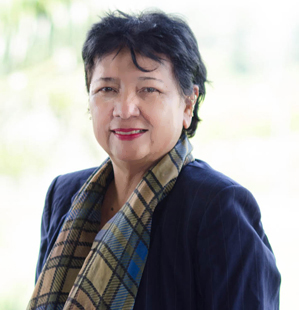
Grace “Gigi” Javier-Alfonso
To describe the life of Dr. Grace Javier Alfonso as exciting and inspiring is an understatement. She is a multi-awarded artist, a painter, sculptor, filmmaker, director for television, film researcher, a multimedia artist, a film critic, teacher, communicator, and a lifelong learner. Dr. Alfonso’s life can be characterized as a fervent exploration of new platforms and mediums to tell her story, to communicate with a larger audience, and to collaborate with a diverse sets of people. As she said, life for an artist is “allowing people to masticate on your work, and hopefully allowing them to understand”.
Dr. Alfonso is one of only two artists who have been permitted by the University of the Philippines to cast and create the iconic UP Oblation. She has participated in numerous group exhibits and held her own solo shows to display her work as a painter and sculptor. Her most recent work is called “The Culture of Sharing Wisdom”, a public sculpture displayed in front of the UP Open University featuring a tableau of katakataka leaves, seemingly disconnected by distance but bridged together as one. This sculpture also represents her insights on the role of the University of the Philippines in providing a shared space for the disconnected to create knowledge. As the erstwhile Chancellor of UP Open University, Dr. Alfonso is passionate about making education accessible, and in advocating lifelong learning and Technology Mediated Education, particularly, Open and Distance eLearning.
Dr. Alfonso has always been surrounded by art even as a child. Her mother owned an antique shop and put up a gallery on the second floor of their house, called “Aba ng Sining”. When she was still a Fine Arts student at the University of the Philippines Diliman where she majored in Painting, Dr. Alfonso would hold classes there and would teach art to students.
Eventually, she moved on from the solitary nature of painting to the more collaborative art and science of film. For her, she viewed film as a different medium of reinterpreting her thoughts. After graduating with a bachelor’s degree in Fine Arts at the University of the Philippines, she went on to teach photography and visual communication at the College of Mass Communication. As time went by, she got into film and communication. From working with pictures and using them to communicate her thoughts, she said that she naturally moved to working with film because they are a series of pictures used to convey a message to connect to society.
Compared to painting or sculptures which are viewed by fellow artists visiting her exhibits, her work in film and television allowed her to reach into the daily lives of her audiences. During her work in television, she offered a variety of new programs in her aim of expanding the choices in the country. According to her, “[she] wanted to bring out stories that have been perpetuated through time as such but using other pair of lenses to view them and bring out new knowledge in the process.” She worked with IBC 13, and created the first miniseries in the Philippines. According to her, she has probably directed more than 100 dramas and helped write more. She said that if she did not write the work, she always made sure that they were written by young women writers and ensured that their voices were heard. Not only this, she also provided a platform for younger filmmakers to reach a wider audience by showing their short films in mainstream television. For Dr. Alfonso, she finds platforms that will not only amplify her voice but also of the younger generation.
Being a mentor has been a huge part of Dr. Alfonso’s life. While working in television and film, she was also a faculty at the University of the Philippines. When asked why she kept on teaching, she said it felt natural for her to become an academic. She said that going to universities to mentor was the right path in sharing what is happening to the world. As she was writing for her column as a film critic in the Daily Tribune, as “Sights and Sounds” and in Malaya as “Kultura Popular”, she was looking at film and writing about it using society and the world as the contexts. As she approached writing about films, she recognized the importance of documenting her analyses in conjunction with writing about them as pieces of cultural heritage. As an academic, writing about films is a way of contributing to this cultural heritage by documenting how certain thoughts and insights reflect the context from which these films emerged. In part, she wanted to be able to share and communicate these thoughts through teaching and be able to guide the new breed of filmmakers and communicators.
Above all, further helping in the establishment the UP Open University is one of the biggest challenges for Dr. Alfonso. She is an advocate of education for all and has moved towards making it more accessible. She started as the Dean of Distance Education for UP Open University in 1995, then became the Director of UPOU Audio-Visual Teaching and Learning Laboratory in 1999, and eventually the Director of the UPOU Multimedia Center in 2004. For her, she was already prepared to become the Chancellor of UPOU due to her years of service in developing methods to improve distance learning in the Philippines. She served her first term as the Chancellor of UPOU in 2007 during a time where UPOU went completely online. Prior to this, modules were printed and mailed to the students. During her time, the programs went through overhauls and retooling to adapt the courses to an online setup. Her term saw the establishment of MOOCs.
Dr. Alfonso became the Executive Director of TVUP in 2016. TVUP is an Internet television network, or webcast, that produces and broadcasts different informational and educational programs. From documentaries to short films, and webinars, the efforts and advocacies of Dr. Alfonso are well reflected in each aspect of this project. She recalled how she had to defend the establishment of the TVUP to the Board of Regents, who were skeptical of the project, claiming that a TV station was too expensive for the University. However, Dr. Alfonso convinced the Board as she explained that TVUP would be cheap to run it online. Similar to what she resolved during her time in IBC 13 and UPOU, she provided a platform for filmmakers and communicators to showcase their work in public. She also utilized it as a multimedia platform for educational content to increase accessibility for information.
Despite her numerous accomplishments, there is no slowing down for Dr. Alfonso. Her latest project is a graphic novel, entitled “Sora: Ang Babae Para sa Bayan”, about the life and works of Melchora Aquino. Albeit a new medium for her, Dr. Alfonso said she is not afraid of exploring new projects and is excited to collaborate with new people. It seemed that the life of Dr. Alfonso is characterized by continuously re-interpreting herself by telling her own stories through different mediums. Her life work is a collaborative experience, filled with stories of her redefining herself and reclaiming her identity. From art to the academe to being the Chancellor of UPOU and Executive Director of TVUP, her life’s story has been about exploring new avenues to reach more people, explore new choices, and bridging the barriers to share knowledge.
In her current work, she wants to push people to create more documentaries and present a visual narrative that goes beyond the lines of print. She hopes to allow filmmakers and communicators to have an avenue to document ways of lives of our people and their relationships, communities, and environments. With the world going into multimedia, she mentioned that there are new added dimensions to the medium: connectivity, interactivity, and ubiquity. With these new dimensions, she hopes to see the new age of filmmakers and social scientists maximizing this new space and help maintain a culture of sharing knowledge and wisdom.
Full article about the life of Dr. Grace Javier-Alfonso may be read at PSSC’s Social Science Information Vol 49.
